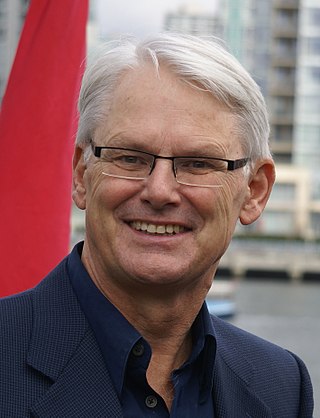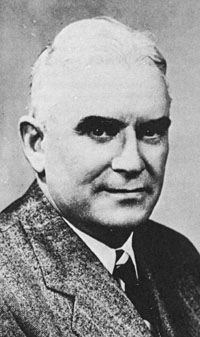Related Research Articles
BC United (BCU), known until 2023 as the British Columbia Liberal Party or BC Liberals, is a provincial political party in British Columbia, Canada. On August 28, 2024, they suspended their campaign for the upcoming provincial election, putting the future of their party status up for question. The party has been described as conservative, neoliberal, and being on the centre-right of the left–right political spectrum. The party commonly describes itself as a "free enterprise coalition" and draws support from members of both the federal Liberal and Conservative parties. Since the 1990s, BC United has been the main centre-right opposition to the centre-left New Democratic Party (NDP). Once affiliated with the Liberal Party of Canada, the British Columbia Liberal Party became independent in 1987. The party changed its name to BC United on April 12, 2023.

The 1997 Canadian federal election was held on June 2, 1997, to elect members to the House of Commons of the 36th Parliament of Canada. Prime Minister Jean Chrétien's Liberal Party won a second majority government. The Reform Party replaced the Bloc Québécois as the Official Opposition.

The 1993 Canadian federal election was held on October 25, 1993, to elect members to the House of Commons of the 35th Parliament of Canada. Considered to be a major political realignment, it was one of the most eventful elections in Canada's history. Two new regionalist parties emerged, finishing second and third in seat count. Most notably, the election marked the worst defeat for a governing party at the federal level and among the worst ever suffered by a governing party in the Western democratic world. In a landslide, the Liberal Party, led by Jean Chrétien, won a majority government.

The British Columbia Social Credit Party, whose members are known as Socreds, was the governing provincial political party of British Columbia, Canada, for all but three years between the 1952 provincial election and the 1991 election. For four decades, the party dominated the British Columbian political scene, with the only break occurring between the 1972 and 1975 elections when the British Columbia New Democratic Party governed.

The British Columbia Unity Party was a political party in British Columbia, Canada. The party was founded as an attempted union of five conservative parties: the Reform Party of British Columbia, the British Columbia Social Credit Party, the British Columbia Conservative Party, the British Columbia Party, and the Family Coalition Party of British Columbia. Members from the first four parties joined with the Family Coalition Party to refound the Family Coalition Party as the BC Unity Party on January 10, 2001. The party was formed to present a united conservative option to voters in opposition to the centre-right BC Liberals and the centre-left New Democratic Party (NDP).

The Christian Heritage Party of Canada, also referred to as CHP Canada, is a minor social conservative and Christian right federal political party in Canada; it was founded in 1987, the brainchild of two couples in British Columbia, namely Bill and Heather Stilwell who were Roman Catholics and Ed Vanwoudenberg and his wife, Reformed Protestants. CHP advocates for Canada to be governed according to Christian principles and ethics. The party's stated principle is that "the purpose of civil government is to ensure security, freedom, and justice for all its citizens from conception till natural death, by upholding just laws". CHP states that, if the party forms government, it hopes to "apply proven Judeo-Christian principles of justice and compassion to Canada's contemporary public policy needs".

The Social Credit Party of Canada, colloquially known as the Socreds, was a populist political party in Canada that promoted social credit theories of monetary reform. It was the federal wing of the Canadian social credit movement.
The Conservative Party of British Columbia, commonly the BC Conservatives and colloquially known as the Tories, is a provincial political party in British Columbia, Canada. In the early half of the 20th century, the Conservatives competed with the British Columbia Liberal Party for power in the province. However, the party has had only a minor presence in the legislature since the 1950s, and last ran a full slate in 1960. The current party leader is Nechako Lakes MLA John Rustad, who was originally elected as a BC Liberal.
The British Columbia Party was a right-wing political party in the Canadian province of British Columbia, founded in 1998 as a populist party by John Motiuk, a North Vancouver lawyer.

The Reform Party of British Columbia is an unregistered right-wing populist political party in British Columbia, Canada. Although its name is similar to the defunct Reform Party of Canada, the provincial party was founded before the federal party was and it did not have any formal association with it. Their peak of support came in 1996 when they elected two members to the Legislative Assembly of British Columbia.

The 2001 British Columbia general election was the 37th provincial election in the Province of British Columbia, Canada. It was held to elect members of the Legislative Assembly of British Columbia. The election was called on April 18, 2001 and held on May 16, 2001. Voter turnout was 55.4 per cent of all eligible voters.

The 2005 British Columbia general election was held on May 17, 2005, to elect members of the Legislative Assembly (MLAs) of the Province of British Columbia (BC), Canada. The British Columbia Liberal Party formed the government of the province prior to this general election under the leadership of Premier Gordon Campbell. The main opposition was the British Columbia New Democratic Party, whose electoral representation was reduced to two MLAs in the previous provincial election in 2001.

The British Columbia Marijuana Party was a minor political party in the Canadian province of British Columbia that advocated the legalisation of cannabis.

Democratic Reform British Columbia was a progressive–centrist political party in the Province of British Columbia, Canada.
The 1966 British Columbia general election was the 28th general election in the Province of British Columbia, Canada. It was held to elect members of the Legislative Assembly of British Columbia. The election was called on August 5, 1966 and held on September 12, 1966. The new legislature met for the first time on January 24, 1967.

The 1952 British Columbia general election was the 23rd general election in the Canadian province of British Columbia. It was held to elect members of the Legislative Assembly of British Columbia, alongside a plebiscite on daylight saving time and liquor. The election was called on April 10, 1952, and held on June 12, 1952. The new legislature met for the first time on February 3, 1953.
The 1949 British Columbia general election was the 22nd general election in the Province of British Columbia, Canada. It was held to elect members of the Legislative Assembly of British Columbia. The election was called on April 16, 1949, and held on June 15, 1949. The new legislature met for the first time on February 14, 1950.
The 1945 British Columbia general election was the 21st general election in the Province of British Columbia, Canada. It was held to elect members of the Legislative Assembly of British Columbia. The election was called on August 31, 1945, and held on October 25, 1945. The new legislature met for the first time on February 21, 1946.
The 1941 British Columbia general election was the twentieth general election in the Province of British Columbia, Canada. It was held to elect members of the Legislative Assembly of British Columbia. The election was called on September 9, 1941, and held on October 21, 1941.
The 1924 British Columbia general election was the sixteenth general election in the Canadian province of British Columbia. It was held to elect members of the Legislative Assembly of British Columbia. The election was called on May 10, 1924, and held on June 20, 1924. The new legislature met for the first time on November 3, 1924.
References
This article needs additional citations for verification .(October 2007) |